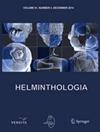人为环境因素对营养传播蠕虫和栖息海鸟的海洋生态系统的影响:重点关注北大西洋、北海、波罗的海和北极海域
IF 1.1
4区 生物学
Q4 PARASITOLOGY
引用次数: 0
摘要
摘要 除自然因素外,人类活动对海洋环境也有重大影响,从而影响脆弱生态系统的进程。本综述的主要目的是总结目前对人为因素如何影响螺旋体、其中间宿主以及作为其最终宿主的海鸟的海洋生物生态系统的认识。此外,它还强调了目前在这一生态系统方面存在的知识空白,为了更全面地了解这些相互作用,应该填补这些空白。这项工作主要关注寄生在北大西洋和北冰洋海鸟体内的螺旋体。海鸟螺旋体复杂的生命周期可能会受到捕捞和水产养殖的影响,因为捕捞和水产养殖会干扰鱼类和海鸟物种的数量,而后者也会影响中间宿主(海洋双壳贝类和鱼类物种)的地理分布,因此可能会改变相互交织的海洋生态系统。温度升高、海水酸化以及环境污染物可能会对这一互动生态系统的不同部分产生负面或正面影响,并可能导致寄生虫和/或中间宿主和最终宿主的数量或区域分布发生变化。有机污染物和微量元素可能会削弱寄主海鸟的免疫系统,从而影响最终寄主控制内寄生虫的能力。另一方面,在某些情况下,蠕虫似乎起到了微量元素汇的作用,从而降低了鸟类组织中重金属的浓度。此外,这篇文章还描述了螺旋体在海鸟群体大规模死亡事件中的作用,除了自然原因(天气、病毒和细菌感染)外,还有人为原因(如漏油、气候变化、过度捕捞和环境污染)。本文章由计算机程序翻译,如有差异,请以英文原文为准。
Impact of anthropogenous environmental factors on the marine ecosystem of trophically transmitted helminths and hosting seabirds: Focus on North Atlantic, North Sea, Baltic and the Arctic seas
Summary Alongside natural factors, human activities have a major impact on the marine environment and thus influence processes in vulnerable ecosystems. The major purpose of this review is to summarise the current understanding as to how manmade factors influence the marine biocenosis of helminths, their intermediate hosts as well as seabirds as their final hosts. Moreover, it highlights current knowledge gaps regarding this ecosystem, which should be closed in order to gain a more complete understanding of these interactions. This work is primarily focused on helminths parasitizing seabirds of the North Atlantic and the Arctic Ocean. The complex life cycles of seabird helminths may be impacted by fishing and aquaculture, as they interfere with the abundance of fish and seabird species, while the latter also affects the geographical distribution of intermediate hosts (marine bivalve and fish species), and may therefore alter the intertwined marine ecosystem. Increasing temperatures and seawater acidification as well as environmental pollutants may have negative or positive effects on different parts of this interactive ecosystem and may entail shifts in the abundance or regional distribution of parasites and/or intermediate and final hosts. Organic pollutants and trace elements may weaken the immune system of the hosting seabirds and hence affect the final host’s ability to control the endoparasites. On the other hand, in some cases helminths seem to function as a sink for trace elements resulting in decreased concentrations of heavy metals in birds’ tissues. Furthermore, this article also describes the role of helminths in mass mortality events amongst seabird populations, which beside natural causes (weather, viral and bacterial infections) have anthropogenous origin as well (e.g. oil spills, climate change, overfishing and environmental pollution).
求助全文
通过发布文献求助,成功后即可免费获取论文全文。
去求助
来源期刊

Helminthologia
生物-动物学
CiteScore
1.80
自引率
0.00%
发文量
21
审稿时长
>12 weeks
期刊介绍:
Helminthologia (HELMIN), published continuously since 1959, is the only journal in Europe that encompasses the individual and collaborative efforts of scientists working on a different topics of human, veterinary and plant helminthology. The journal responsibility is to enrich the theoretical and practical knowledge in very specific areas and thus contribute to the advancements in human and veterinary medicine and agronomy. Taking the advantage of comprehensive and multidisciplinary approaches journal still maintains its original spirit and is principal source of fresh scientific information regarding helminths, endoparasites and plant parasites. Addressing the most up-to date topics journal gained rightful and exceptional place next to the other high-quality scientific journals publishing in its field.
 求助内容:
求助内容: 应助结果提醒方式:
应助结果提醒方式:


